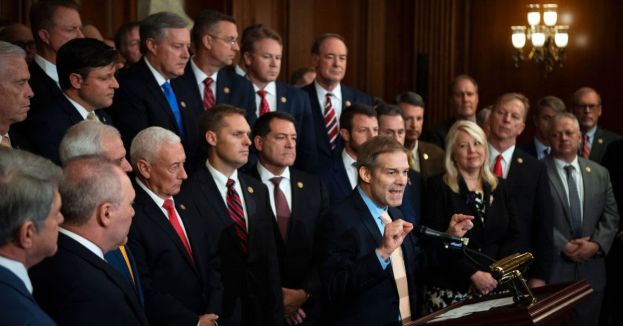The primary cause of their dissatisfaction lies in the absence of any provisions related to border security in the package.
Marshall is now pinning his hopes on House Speaker Mike Johnson, R-La., to accomplish what a small group of Senate Republicans had aimed for in the Democrat-dominated chamber - securing the southern border before dispatching aid to overseas allies.
The Senate had previously rejected a package encompassing border-related provisions, dismissing it as barely addressing border security. Instead, the Senate was urged to consider the House's border policy, known as H.R. 2. This policy includes restrictions from the Trump era and introduces stricter screenings for asylum claims.
WATCH: BRITISH COLONEL RICHARD KEMP REPORTING FROM GAZA![]()
"I would love to see Speaker Johnson take H.R. 2 and add it to the bill that we passed," Marshall expressed in an interview with Fox News Digital on Tuesday. "I think that's something that a super majority of Republicans could support."
WATCH: NO CLUE WHY THEY ARE PROTESTING: "I WISH I WAS MORE EDUCATED"![]()
February 15, 2024
Marshall expressed his dissatisfaction with the Senate's approval of approximately $60 billion in aid to Ukraine, citing several instances of inadequate auditing of funds. However, he stated his willingness to "trade that in return for meaningful border security" if the House decides to attach Ukraine aid to their bill.
TRUMP READY TO DEBATE BIDEN 'ANYWHERE, ANYTIME, ANYPLACE,' BUT WILL IT HAPPEN?![]()
The foreign aid package received votes in favor from both Sen. Majority Leader Chuck Schumer, D-N.Y., and Sen. Minority Leader Mitch McConnell, R-Ky.
"Many of us are horribly disappointed there was no border security in this package," Marshall lamented. "It was a very closed process." The inability of both Republicans and Democrats to reach a consensus on bringing several filed amendments to the floor for debate resulted in the package's passage without them.
CRITICS SLAM BIDEN'S ATTEMPT TO RELATE PERSONAL TRAGEDY TO POLICE OFFICER DEATHS![]()
"More than half of the Republican caucus did not support this bill," Marshall added. "And that's why it's not going to fly in the House. Speaker Johnson is not going to bring something to the floor, unless he has the majority of the majority."
FROM DISGRACE TO REDEMPTION: DAN RATHER TO MAKE UNEXPECTED RETURN TO CBS![]()
Johnson has already indicated that the House would not consider the Senate's foreign aid bill. Instead, they would draft their own bill, incorporating border security provisions. However, it remains uncertain whether the House's aid package would include assistance to Ukraine.
KARMA IS A B*TCH: COUNCIL MEMBERS WHO CRITICIZED NYPD NOW BEGGING FOR THEIR PROTECTION![]()
"The mandate of national security supplemental legislation was to secure America’s own border before sending additional foreign aid around the world," Johnson stated. "It is what the American people demand and deserve. Now, in the absence of having received any single border policy change from the Senate, the House will have to continue to work its own will on these important matters. America deserves better than the Senate’s status quo."
BOMBSHELL REPORT: THE SECRET PLOT TO OUST KARINE JEAN-PIERRE![]()
Sen. Lindsey Graham, R-S.C., typically a supporter of foreign defense spending, also voted against the package. He argued that aiding Ukraine, Israel, and Taiwan "makes sense, but not this way."
"America’s border is a disaster. We are $34 trillion in debt. It is time to help our allies while also helping ourselves," he stated. Graham deemed the bill as "rightly DOA in the House" and expressed support for former President Trump's proposal to make the foreign assistance a loan.
SECRET SERVICE SHENANIGANS: VP HARRIS' BRAWLING BODYGUARD STORY TAKES A TWISTED TURN![]()
In a post on Truth Social earlier this week, Trump stated, "THE DEAL SHOULD BE (CONTINGENT!) THAT THE U.S. IS HELPING YOU, AS A NATION, BUT IF THE COUNTRY WE ARE HELPING EVER TURNS AGAINST US, OR STRIKES IT RICH SOMETIME IN THE FUTURE, THE LOAN WILL BE PAID OFF AND THE MONEY RETURNED TO THE UNITED STATES. WE SHOULD NEVER GIVE MONEY ANYMORE WITHOUT THE HOPE OF A PAYBACK, OR WITHOUT 'STRINGS' ATTACHED. THE UNITED STATES OF AMERICA SHOULD BE ‘STUPID’ NO LONGER!"
Following a lengthy procedural process, the Senate passed the $95 billion national security supplemental package to assist Ukraine, Israel, and the Indo-Pacific. The process concluded early Tuesday morning after GOP lawmakers spent hours filibustering it.
In a press conference on Tuesday morning, Schumer lauded the package as "one of the most historic and consequential bills" to ever pass in the upper chamber.
"The responsibility now falls on Speaker Johnson and House Republicans to approve this bill swiftly," Schumer stated. "And I call on speaker Johnson to rise to the occasion to do the right thing."
The final vote stood at 70 to 29, with 22 Republicans voting yes. Democratic Sens. Peter Welch and Jeff Merkley, along with independent Sen. Bernie Sanders, voted no.
The supplemental package, which comes as the national debt soars above $34 trillion, includes $60 billion for Ukraine, $14 billion for Israel, $9 billion in humanitarian assistance for Gaza, and nearly $5 billion for the Indo-Pacific. Calls to offset the spending with cuts elsewhere were ignored. Several Republicans spent hours — since the beginning of the weekend — collectively filibustering the package on the Senate floor. Sen. Mike Lee, R-Utah, committed to filibustering the bill for four hours on Saturday and continued early Tuesday.
The package was brought up for a vote after Republicans last Wednesday blocked a $118 billion package that included numerous border and immigration provisions, which had been negotiated by a bipartisan group of senators and Biden officials.








 Discover alternative ideas that will make you think
Discover alternative ideas that will make you think Engage in mind bending debate
Engage in mind bending debate Earn points, rise in rank, have fun
Earn points, rise in rank, have fun


